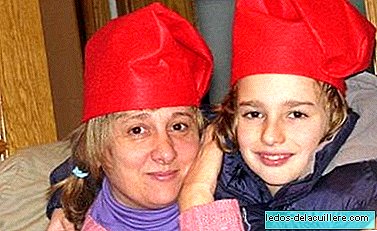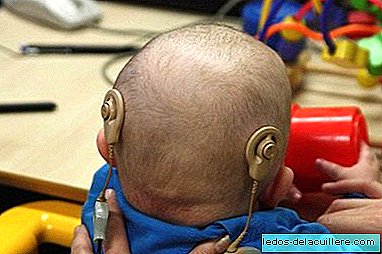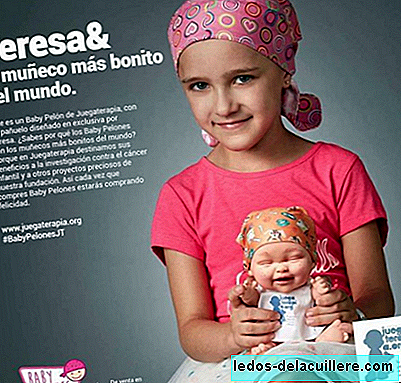
Human beings live in communities: the nuclear and extended family, the community, educational or leisure groups and society in general. To be able to live together exercising our freedom but respecting that of others, exercising our rights but without stepping on those of others we need standards.
The rules are necessary for children
For the children, who are learning to live together, the rules are very important. They help them understand what behaviors are acceptable and which are not, allowing them to also develop their own mechanisms to channel desires and emotions.
Knowing and experiencing the standards is an indispensable experience for your global development as people. They are, in short, a right they have.
However, we don't always understand that. the rules. We use them to control their natural impulses and even their creativity or their expression. Children, like small mammal pups and human beings endowed with rationality and feelings, are not miniature adults and their needs do not always agree with what we consider acceptable. That is why the norms are not fixed entelechies or laws for the benefit of the wishes of adults.
Above all, children need the rules to be understandable and acceptable, consistent, responsible and respected by adults. For them it is the example, and not the imposition or the threat, the best way to make them internalize the norms.
The reference adult (s), in an almost one-to-one ratio, that is, their parents or persons loved by them and who love them, are the best guide to understand the need for the rules and their limits.
Agree and explain the rules
They must be allowed to question them and participate in their formulation, always, of course, within the logic and respect for all members of the communities in which they are fixed.
Each family has to set their own standards, according to their customs and ideas, but always with some points in common that will help make the convention more enjoyable for everyone and incorporate children to the standards as an element of safety and comfort, not as an adult tax not included.
Some ideas to develop our own standards with a solid foundation would be not to use violence or threat, not to use physical or psychological punishment, not to threaten to withdraw love or care.
In addition, the rules must be known and expressed previously, allowed to be questioned or asked about their need, explain, within the limits of each child's development, the reasons for setting them and always setting standards that defend and protect the interest and Children's rights: safety, health and their physical, emotional and moral integrity.
As I said, being open to questions and questions is the great recipe. It allows the child to express their doubts without fear and with confidence, without fear of punishment, being heard.
Of course, there will be rules that children do not want to accept or do not understand. Always, in the really important things, it is necessary to understand that, once the negotiation is tried, the adults will have the last word but always explaining the reasons with affection and respect.
The formulation of the norms, within the limits of pure prudence, may change as the years pass.
The Constitution of my home
We, for example, have written a Constitution of our home. It is the result of years of work and a common study on the rights and needs of both. I leave it to you, in case it can give you ideas, but, of course, as I said, each family is a world, and many of our rules only work for us.
This is the Constitution of my house and it is the law that we must all respect to live in peace and equality. We celebrated it with a party and we even made some Phrygian caps to represent that freedom needs common norms to be exercised.
First article: All the members of this family have to treat each other with respect and we are free, although each one must have different obligations for his age. Second article: We are all equal before the law and no one can be discriminated against by age, sex, religion or opinion. Article three: It is forbidden to punish, hit, insult, humiliate or spend jokes that harm. Fourth article: We all have the right to have our own opinion and to express it without fear. Article five: We all have to take care of ourselves, protect ourselves and be affectionate. Article 6: We all have to take care of the house, clean it and tidy it up, each according to their age and possibilities. Article 7: You have to take your shoes off the street when entering the house. Article 8: One could not get into bed with street clothes. Ninth article: You have to pick up the table after eating. Tenth article: Everyone will eat up to the amount they want and there is no eating what they don't like or don't feel like. Food is not an obligation, but it is healthy eating. Article eleven: Smoking is not allowed if there are children at home. Article twelve: We all have the right to our privacy, to knock on the door if we are in our room and not enter without permission. Article thirteen: Every day you have to learn something. Article fourteen: It is forbidden to send some memory study. Article fifteen: You have to sleep when you are sleepy but you have to be responsible since your rest and that of others must be respected. Article sixteen: You have to recycle. Article seventeen: You have to pick up after playing. Article eighteen: The clothes cannot be left piled up on the beds, they must be stored. Article Nineteen: No one can be invited without the other's permission. Article twenty: Adults should advise and care for children, explaining the reasons for the rules and the things they consider necessary to do at all times.
The rules, when children are very young, we must set, but as they grow and learn, with our example, respect and responsibility, we can agree and even have them written. What do you think about the rules and the possibility of agreeing and explaining them?












